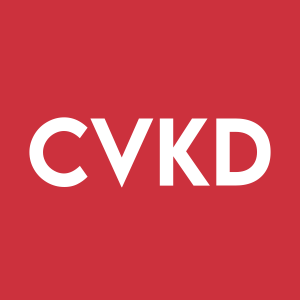Cadrenal Therapeutics Receives FDA Orphan Drug Designation for Tecarfarin for Prevention of Thromboembolism and Thrombosis in Patients with LVADs, RVADs, Biventricular Assist Devices, and Total Artificial Hearts
FDA designation provides potentially seven years of market exclusivity after approval and expanded partnering opportunities for tecarfarin
"This second orphan drug designation highlights the expanded need for tecarfarin where existing anticoagulation therapies are inadequate," said Quang Pham, Founder, Chairman and Chief Executive Officer of Cadrenal Therapeutics. "We are dedicated to advancing tecarfarin through clinical development options as swiftly as possible."
The FDA's ODD program provides incentives to sponsor organizations for the development of innovative treatments for rare diseases that affect fewer than 200,000 people in the
All patients with VADs require chronic anticoagulation to prevent the formation of thrombus (clot) which can cause the device to fail or can result in a clot breaking off (embolizing), resulting in a stroke or other vascular catastrophe.
The current market-leading direct oral anticoagulants (DOACs), such as Eliquis, are not indicated for patients with VADs due to a lack of evidence of benefit. Moreover, a recent study revealed that the level of anticoagulation achieved with warfarin, the only currently available Vitamin K Antagonist (VKA), is maintained in the target range only
ABOUT CADRENAL THERAPEUTICS, INC.
Cadrenal Therapeutics is developing tecarfarin for unmet needs in anticoagulation therapy. Tecarfarin is a late-stage novel oral and reversible anticoagulant (blood thinner) to prevent heart attacks, strokes, and deaths due to blood clots in patients with rare cardiovascular conditions. Tecarfarin has orphan drug and fast-track designations from the FDA for the prevention of systemic thromboembolism (blood clots) of cardiac origin in patients with end-stage kidney disease (ESKD) and atrial fibrillation (AFib) and just received orphan drug designation for the prevention of thrombosis and thromboembolism in patients with ventricular assist devices (VADs). Cadrenal is also pursuing additional regulatory strategies for unmet needs in anticoagulation therapy for patients with thrombotic antiphospholipid syndrome (APS). Tecarfarin is specifically designed to leverage a different metabolism pathway than the oldest and most commonly prescribed Vitamin K Antagonist (warfarin). Tecarfarin has been evaluated in eleven (11) human clinical trials and more than 1,000 individuals. In Phase 1, Phase 2, and Phase 2/3 clinical trials, tecarfarin has generally been well-tolerated in both healthy adult subjects and patients with chronic kidney disease. For more information, please visit www.cadrenal.com.
Safe Harbor Statement
Any statements contained in this press release about future expectations, plans, and prospects, as well as any other statements regarding matters that are not historical facts, may constitute "forward-looking statements." These statements include statements regarding tecarfarin addressing unmet needs in anticoagulation therapy and the ability to derive the anticipated and potential benefits from the recent Orphan Drug Designation for tecarfarin, including seven years of market exclusivity, and the expanded development and commercial partnering for tecarfarin as a result of the Orphan Drug Designation. The words "anticipate," "believe," "continue," "could," "estimate," "expect," "intend," "may," "plan," "potential," "predict," "project," "should," "target," "will," "would" and similar expressions are intended to identify forward-looking statements, although not all forward-looking statements contain these identifying words. Actual results may differ materially from those indicated by such forward-looking statements as a result of various important factors, including the Company's ability to derive the anticipated benefits from the recent Orphan Drug Designation for tecarfarin and the other risk factors described in the Company's Annual Report on Form 10-K for the year ended December 31, 2023, and the Company's filings with the Securities and Exchange Commission, including periodic reports on Quarterly Reports on Form 10-Q and Current Reports on Form 8-K. Any forward-looking statements contained in this press release speak only as of the date hereof and, except as required by federal securities laws, the Company specifically disclaims any obligation to update any forward-looking statement, whether as a result of new information, future events, or otherwise.
For more information, please contact:
Cadrenal Therapeutics:
Matthew Szot, CFO
858-337-0766
press@cadrenal.com
Investors:
Lytham Partners, LLC
Robert Blum, Managing Partner
602-889-9700
CVKD@lythampartners.com
![]() View original content to download multimedia:https://www.prnewswire.com/news-releases/cadrenal-therapeutics-receives-fda-orphan-drug-designation-for-tecarfarin-for-prevention-of-thromboembolism-and-thrombosis-in-patients-with-lvads-rvads-biventricular-assist-devices-and-total-artificial-hearts-302111758.html
View original content to download multimedia:https://www.prnewswire.com/news-releases/cadrenal-therapeutics-receives-fda-orphan-drug-designation-for-tecarfarin-for-prevention-of-thromboembolism-and-thrombosis-in-patients-with-lvads-rvads-biventricular-assist-devices-and-total-artificial-hearts-302111758.html
SOURCE Cadrenal Therapeutics, Inc.








